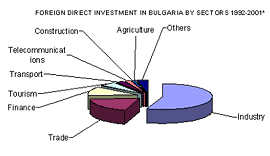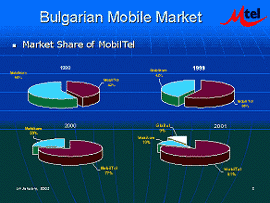 INFRASTRUCTURE INFRASTRUCTURE |
 Transport Transport
The advantageous geographical location of Bulgaria determines the special importance of transport development. Highways and railways link to European axes, notably the E80 motorway, and provide the most direct overland gateway between Western Europe, Turkey and the Middle East.
Infrastructure development is focused on several projects: European Crete Transport Corridors No. IV, VII, VIII, IX, X (totalling USD 4,068.4 mln). Investment projects for the modernization of Sofia and Bourgas Airports (total volume of USD 401 mln) have been launched. The construction of a second bridge over the Danube River between Vidin and Kalafat (Romania) will significantly increase the traffic capacity over the river.

Additional projects include the restructuring of the Bulgarian State Railways Company 'BDZ', rehabilitation of the national road network, the Trans-European Motorway, and a ring transport corridor around the Black Sea coast.
 Telecommunications and Information Technologies Telecommunications and Information Technologies
This is one of the most challenging sectors for foreign investors. Due to the country's strategic location on the Balkans, Bulgaria serves as a cross-point for telecommunications traffic from Europe to the Middle East, and also to the Southern parts of CIS and Asia.
Basic principles of the sector policy are de-monopolization, liberalization, competition and creation of favourable conditions for foreign investment inflow. In year 2000, over 700 operators have presented radio and TV services (incl. through cable network), paging, mobile voice services, data transmissions (incl. Internet), satellite transmissions etc.
The sale of the Bulgarian Telecommunications Company (BTC), a state monopoly, will be one of the priority privatization projects of the new government. In accordance with the investment strategy of BTC, a digital operation network is built under which major Bulgarian cities have already been connected (DON Project at amount of USD 150 mln). In the sub-sector of cellular telephones up to December 2001, three operators had licenses for national covering - Mobikom (analogue mobile network) and MobilTel and COSMO Bulgaria Mobile (digital mobile networks). By rate of development in 2000, the Bulgarian market of mobile telephone services is ranked at 5th position among the countries of Central and East Europe. Currently, the three operators have about 1,6 million subscribers, with the bulk (1.3 million) concentrated in MobilTel.

Bulgaria presents relatively slow developed Internet
services and has great potential in this direction.
Telephone switch exchange manufacturing in Bulgaria
also provides another good opportunity for foreign
investors. During the '70s and '80s Bulgaria developed
a strong electronics and communications industry
within the framework of the former socialist countries
in Central and Eastern Europe. However, due to the
general economic downturn after 1989, Bulgaria experienced
a loss of markets, and lacking the capacity to compete
on a global scale, the focus on the ICT industry
was lost. |
It was only during the last four years, when parallel to the general economic recovery, the importance of ICT for the economy and the society was recognized, partly driven by the application of the country for EU accession.
The government of Bulgaria has adopted an Information Society Strategy to put a special emphasis on the use of ICT in all areas of the economy. Equal access to modern, efficient and high-quality telecommunication and information services, including opportunities to acquire the appropriate skills, is one of the priorities of this strategy.
Given today's advantages of the country, in particular its human potential, there is a strong opportunity for Bulgaria to assume a leading role in Southeast Europe with respect to ICT. Bulgaria's potential as a technology leader was confirmed by the 2001 global Human Development Report. The Report which explores the issues of "making new technologies work for human development" introduces a Technology Achievement Index (TAI) (The index is calculated on the basis of a number of factors: 1) the creation of technologies 2) the diffusion of recent innovations 3) diffusion of old innovations 4) human skills) which measures countries' ability to participate in the network age. Bulgaria appears in the list of potential leaders, alongside Greece, Portugal, Poland and Malaysia.
Since 1997 ICT has been one of the most dynamic sectors of the economy, which has led to a steady growth of the Information Society in the country. Venture capital and private equity, as well as foreign private investment support the creation and development of Bulgarian companies, which develop systems and software and offer services to clients abroad, thus also stimulating the home market and living conditions in Bulgaria.
The accomplishments in building an adequate infrastructure for the Information Society in Bulgaria have resulted in a dynamic market for ICT products and services, which accounts, to a large extent, for the growth in the Bulgarian economy as a whole. The sector of the economy, which has the greatest IT penetration, is the financial services sector (banking and insurance).
Though IT jobs in Bulgaria are quite attractive, the local IT labour market cannot offer the opportunities sought by young and qualified IT professionals. In order to keep these people in Bulgaria they need to be offered a competitive remuneration package.
 Energy Energy
- Establishment of competitive energy market by working out clear and transparent rules;
- Decreasing the investment risk in energy and strengthening the interest of strategic investors and foreign partners to the electric power sector in the country;
- Achievement of the lowest possible prime cost of energy suppliers and reliability of the energy system;
- Eliminating National Electric Company (NEK) monopoly by grouping the activities according to production, transmission and distribution and achieving of efficient management;
- Considerable increase in the transmission of natural gas within the country, attraction of strategic investors and on that basis launching the restructuring of Bulgargas AD by way of separating transmission from storage and from the gas distribution on middle and lower pressure; setting up regional distribution companies with the participation of the municipalities and local and foreign investors and preparation for the privatisation of the different gas distribution companies;
- Improvement of the quality of services for the population, maintaining the prices of electric energy and increasing the level of revenue collection;
- Implementation of the program for the Bulgarian energy system joining to the European energy networks;
- Initiating the restructuring and privatisation of NEK, Bulgargas AD and central heating companies;
- Adoption of a program to involve strategic private investors for the purpose of establishing a gas distribution market and optimal setting up of the gas distribution regions;
- Determining sources to subside the deficiency of central heating companies and of their long-term investments with the purpose of counteracting the unfavourable international fuel situation;
- Accelerated liquidation or privatisation of the
inefficient and loss-maker mines and establishment
of a mechanism for covering their debts to the National
Social Security Institute, as well as the involvement
of foreign strategic partners and investors in profitable
mining companies |

